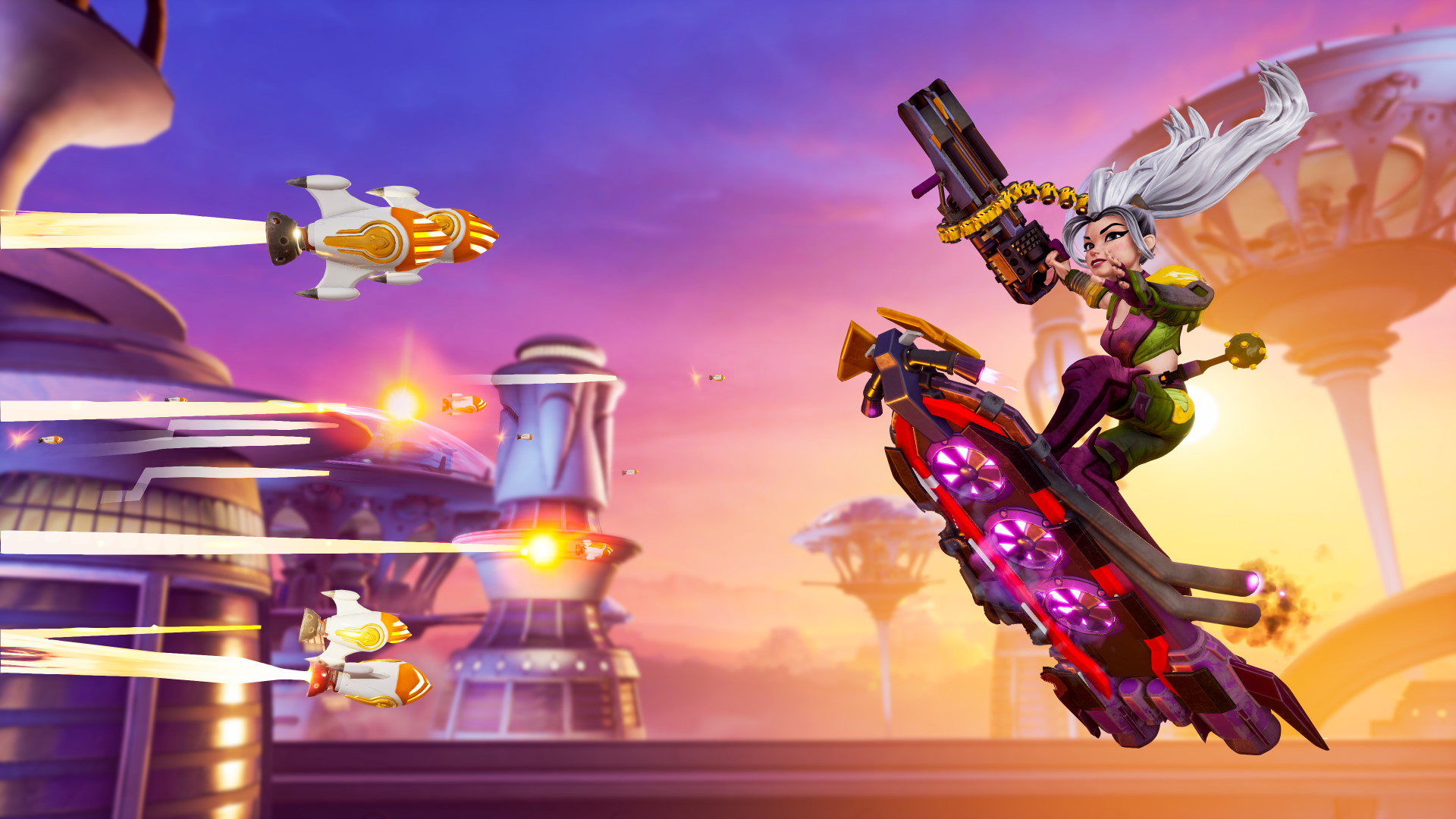GamesRadar+ Verdict
Rocket Arena turns an old standby into a new take on shooters, and what's lost in the translation is made up for with easy-to-learn fun.
Pros
- +
An approachable shooter
- +
Skilful projectile combat
- +
Rocket jumping for the rest of us
Cons
- -
The rockets don't have much oomph
- -
Premium price and microtransactions too
Why you can trust GamesRadar+
Rocket Arena is an arena where everything is rockets. Every shooter you've ever put into rockets-only mode has been leading up to this and it's safe to say that Rocket Arena explores the potential of fuel-propelled projectiles more fully than any other game in history. The question is whether it can pour enough rocket fuel in this narrow niche to blow it up into a long-lived online multiplayer experience, or if it's doomed to fizzle out - especially as a premium multiplayer game in a world of cutthroat free-to-play competition. After playing on live, pre-release servers for a half dozen hours across a couple events, I'm optimistic enough to say that I'll keep riding this rocket wherever it goes.
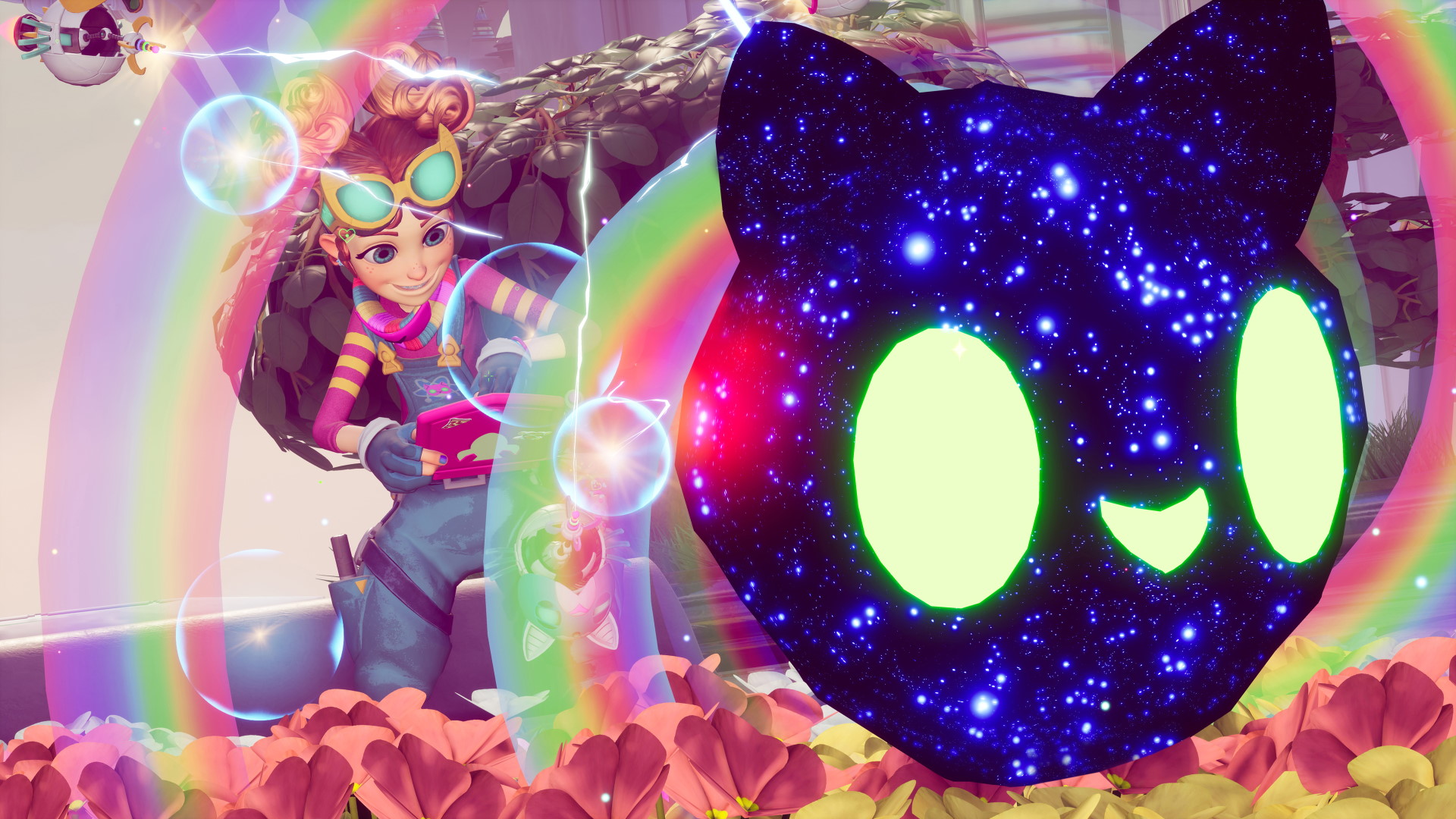
Release date: July 14, 2020
Platforms: PC, PS4, Xbox One
Developer: Final Strike Games
Publisher: EA
Rocket Arena is a hero shooter like Overwatch or Apex Legends. Each of the 10 characters included at launch has their own unique look, story, and special abilities. They all fire rockets as their primary weapons, but they each have different takes on the idea: there's Jayto, who fires a bunch of fast, hard-hitting missiles, or Kayi, who can charge up her explosive crossbow bolts for extra speed, or Blastbeard, who fires arcing cannonballs. Each character also has special ways of getting around the map or repelling enemy attacks.
Though each design is distinct, I didn't feel immediately drawn to any one character based on their looks alone - the way that I looked at Pharah or Pathfinder and knew right away I wanted to be that one. To be fair, I didn't end up maining either of those characters in their respective games after the initial infatuation ended, and it only took me one match with Kayi to know we were going to be best friends. Grappling to the top of a rocky outcropping, floating around in her frosty field that makes her shots extra fast and everybody else's bullet-time slow, and raining frozen death on the enemy team was the highlight of my team with Rocket Arena.
Everyone fights, no one dies
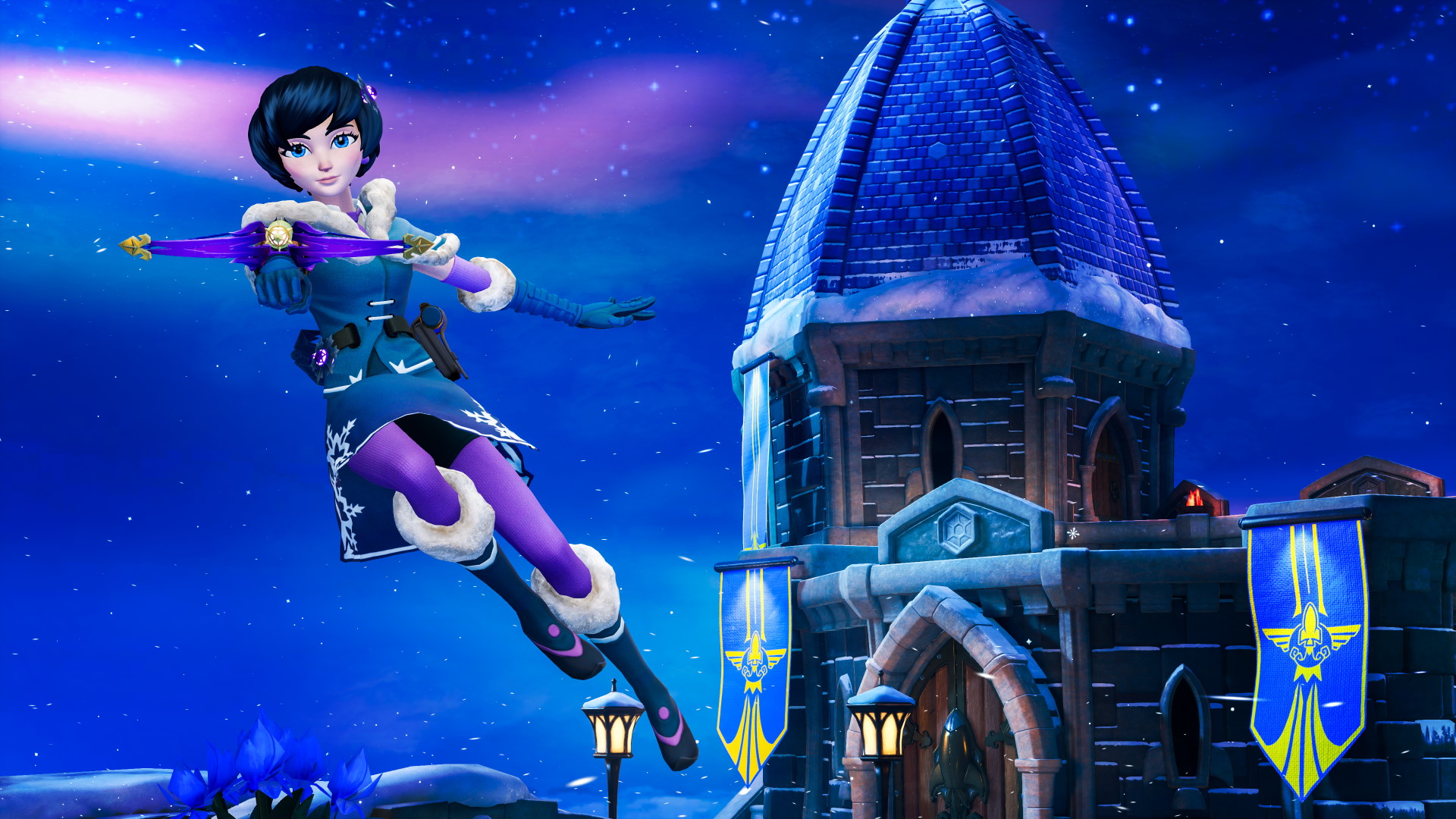
Let me amend that thought: I wasn't raining frozen death on anybody, because nobody dies in Rocket Arena. You only knock folks around, and ideally out of bounds. As you get hit by enemy rockets - whether by direct hits or splash damage from impacting the terrain nearby - a meter at the bottom of your screen fills. This represents how far you'll fly the next time you're hit, and the only way to empty it back out is to avoid taking hits for a while. Think Smash Bros. by way of Quake 3.
That is both the most clever and most disappointing part of Rocket Arena. It's rewarding to see your opponents flying further and further as you combo them into the stratosphere - I found myself instinctively leaning into the screen as I lined up shots, which is always a good sign. It can be frustrating to be on the receiving end of one of those combos, especially if you're far from any cover and sailing straight for a KO, though a dodge move and special abilities give you some tools to deal with desperate situations. It's also pretty easy to pick up how each character's rockets differ in terms of speed, power, and utility.
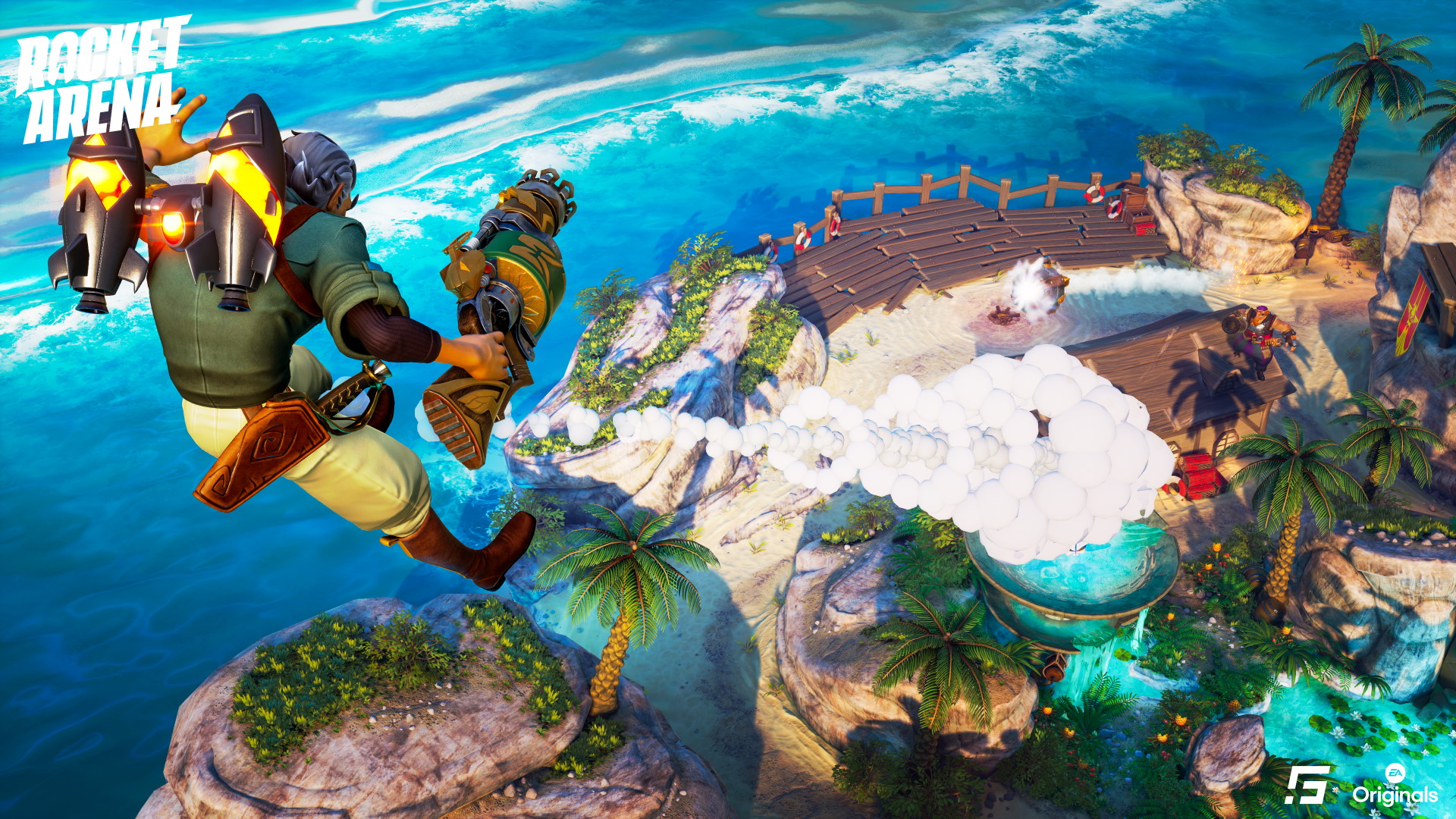
The problem is that Rocket Arena's rockets don't feel that explosive. In the process of being converted from high-powered weapons to bread-and-butter combat and traversal tools they lost their chaotic charm; the simple act of firing a rocket, one of video gaming's most primal joys, doesn't do all that much for me in Rocket Arena. There's a little screenshake, and your reticle kicks a bit, and that's it. A direct hit on an opponent might fill their meter by a third at most and then they'll whip around and start returning fire. Compare that to the wild joy of scoring a crit with The Soldier's rocket in Team Fortress 2, instantly blasting a hole in the enemy team as meaty giblets fly everywhere, and… well, there is no comparison.
These are all sound decisions for creating a smooth, friendly, and watchable game: huge, screen-shaking explosions that result in a shower of gore and a respawn delay probably wouldn't make Rocket Arena more fun to play. The work the developers at Final Strike Games have done to make each characters' rockets have their own personality shines through, and I'm glad they took the usual fundamentals then built on them toward a new direction. I'd be lying if I didn't say I miss the old-school explosions, though.
Achieving liftoff
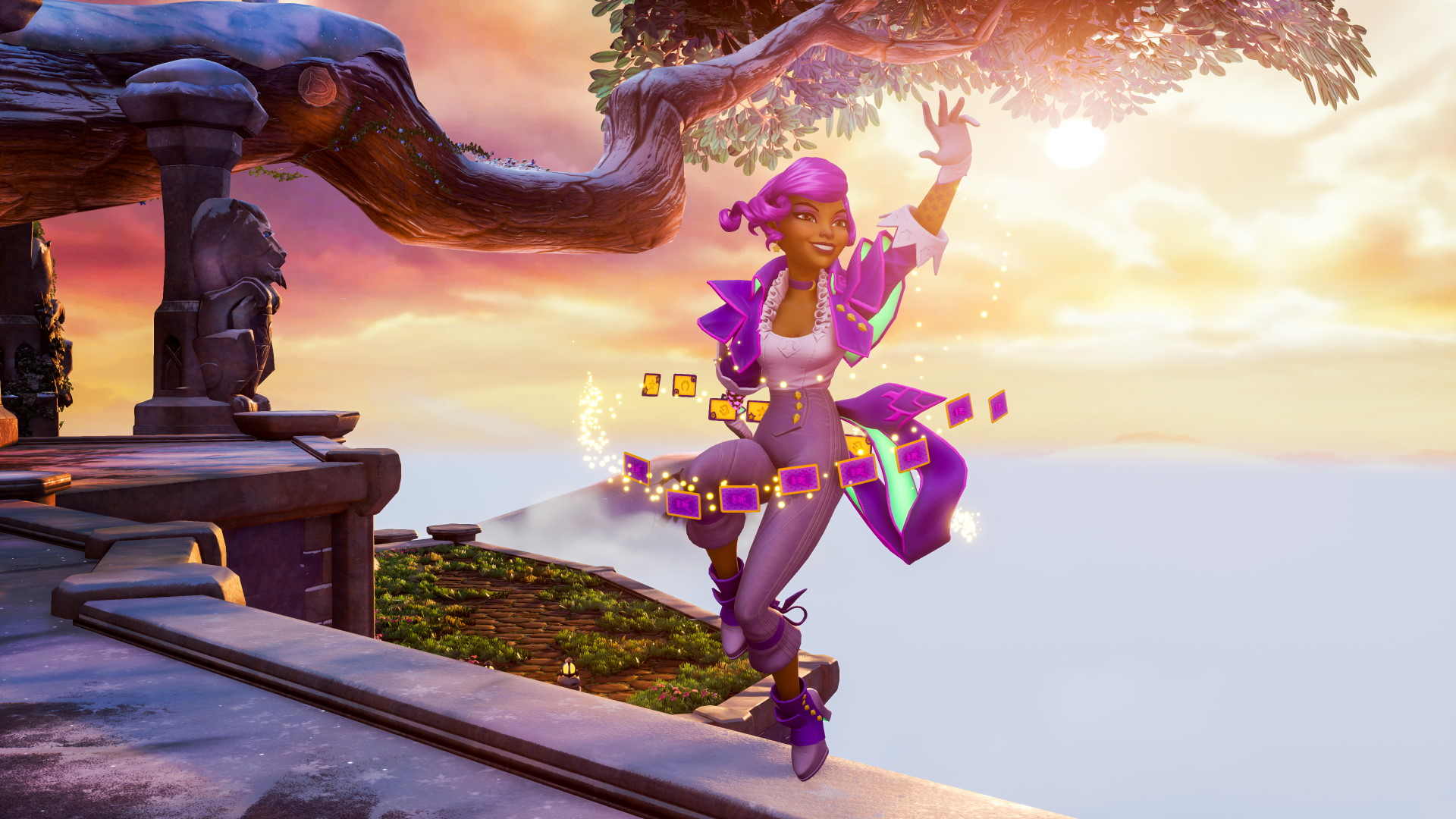
Rocket Arena does let me indulge in a different kind of flight of fancy: actual rocket jumping. I've tried to master it many times in many games, and never gotten beyond the "blowing myself up" part to the "sailing gracefully across the map" part. Rocket Arena makes rocket jumping accessible and forgiving (your own blasts don't hurt you) so anybody can climb around levels with a bit of foot-shooting practice. At one point I even managed to play keep-away with a treasure chest by blasting myself along the bottom edge of the map, fully covered from my ground-dwelling enemies. There's enough skill involved that the truly masterful will be able to soar in circles around newbies, but I was delighted to pull off even a minor feat of rocket gymnastics after years of failed attempts.
While everything I've talked about so far will be playable at launch, Final Strike Games also shared some plans to keep Rocket Arena updated with seasons upon season of new content. I can't talk about any specifics related to those plans yet, except to say the developers let us play with the 11th hero coming in Season 1. The kid genius Flux fights with rocket cat robots, can turn invisible, and is definitely going to shake things up when she arrives on July 28. I can also say it seems like there's little danger of the game going through post-launch doldrums as the developers transition to a live service business model. Full cross-play support across consoles from day one should help with that too.
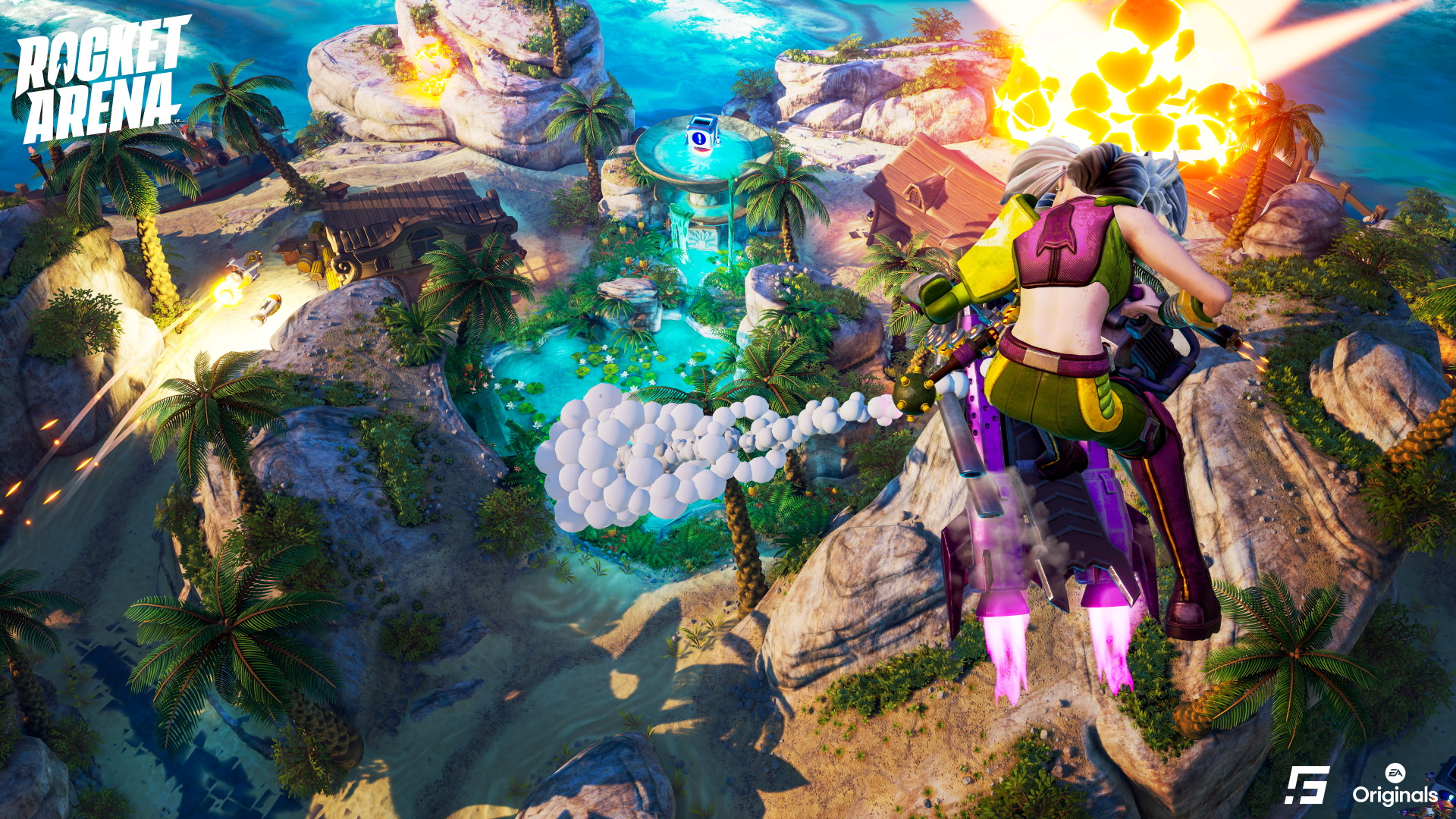
Speaking of business models, you do need to pay upfront to play Rocket Arena; $29.99 / £24.99 for the standard version, or $39.99 / £34.99 for the Mythic Edition that comes with extra goodies. You can also buy seasonal battle passes or purchase individual items as microtransactions from a cash shop. It's only for cosmetics, such as special skins for characters or new blast-off trails. You can buy many of the items with earned currency, and none of it seems out of the ordinary for this kind of game.
Rocket Arena is meant to keep growing for years after it launches, with new characters, maps, and modes all expanding the way the game is played across many seasons. But I can only review it as it stands on day one: is it worth your time and money to start playing Rocket Arena as soon as it comes out? If you're looking for a new and approachable take on shooters, and if you can overcome some of your preconceived notions about how many giblets a well-aimed rocket should produce, the answer is "yes" - followed by a series of enthusiastic explosion noises.
Reviewed on PC
I got a BA in journalism from Central Michigan University - though the best education I received there was from CM Life, its student-run newspaper. Long before that, I started pursuing my degree in video games by bugging my older brother to let me play Zelda on the Super Nintendo. I've previously been a news intern for GameSpot, a news writer for CVG, and now I'm a staff writer here at GamesRadar.
